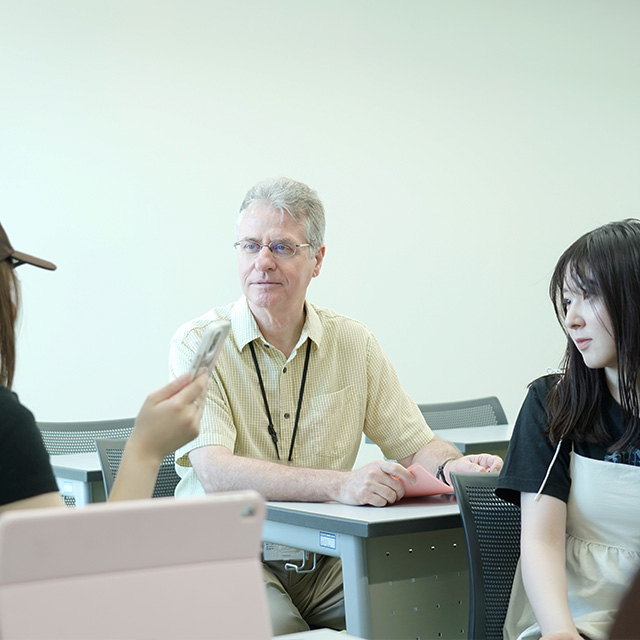

Students of the Department of Intercultural Studies build up their working knowledge of English while studying the cultures of the world, including Japanese culture.
As a fundamental rule, all students are required to attend ESP (English Step-up Program) classes. ESP is a program designed to start with English used in everyday conversation before moving on to improving the four skills needed for major international English tests. Through these classes, students develop the confidence to speak English in real-life English-language speaking environments.
Following ESP, students study abroad for four to eight months at an early point in their four-year program; After returning to Japan, the classes they take within our three specialties are held almost entirely in English.
Through these curricula, students learn the language skills to promote mutual understanding with others who have differing values, develop the insight to understand how to approach multi-faceted issues, and strengthen the ability to find questions and take action toward solutions.
Upon entering the university, all students attend our intensive ESP English classes. Each student's starting point is determined based on their level of English ability, and the program is designed to increase each student's ability, step by step. The program comprises four skills, and each student starts from their current ability level in each skill, making each class as effective as possible for each student.
As a fundamental rule, from the second half of their first year to the midpoint of their second year, all of our students attend a study abroad program for four to eight months at one of our affiliated universities in North America, Oceania, mainland Asia, Southeast Asia, or Europe.
This study abroad experience is not meant simply to provide training in English, but to enable students who pass English language benchmarks to attend standard undergraduate classes, intended for English speakers. By allowing students to study abroad at a relatively early point in their four-year program, they can return to Japan after studying around the world with numerous shared cultural experiences, and their broadened horizons will help inspire further motivation to learn starting early on.
After returning to Japan, students choose from one of three specialties to study in English: the Division of Tourism Studies, where students learn about the cultural significance, effects, and intercultural influence of tourism on modern society; the Division of Comparative Cultural Studies, where students analyze the history and culture of peoples from various countries, learning about mutual relationships from cultural, social, and religious points of view; or the Division of English Studies, where students study the expressive techniques, culture, and way of thinking of English from syntactical and semantic points of view, with the goal of becoming English instructors. At the end of their program, each student submits a final graduation thesis written entirely in English. By concurrently studying the unique ways of life and cultures of various countries, students actually develop a deeper understanding of their own cultures. Students learn to reexamine Japanese culture and their lives in the Hokuriku region from a different point of view, making one of the goals of the faculty to help students find a new set of values.
10-1 Ushi, Gosho-machi, Kanazawa-shi, Ishikawa, 920-8620, Japan
TEL : 076-253-3896 (International Exchange Center)
TEL : +81-76-253-3896 (From outside Japan)
FAX : +81-76-253-3617 (From outside Japan)